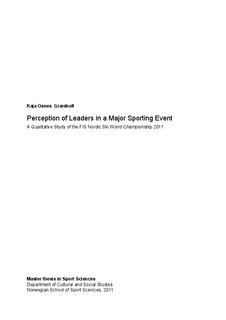| dc.description.abstract | The purpose of this master thesis was to write an article on followers’ perception of
their male and female leaders in a major sporting event. The layout for this thesis is
therefore untraditional as it is divided into two different, but correlating sections. Part I
is the research article. Part II is the supplementary theory and method used in this thesis.
The overall goal for the article was to gain better understanding of leadership in a major
sport event organization. Inspired by Yukl’s (2008) multiple-linkage model, this study
focused on how followers perceived their male and female leaders in accordance to
masculine and feminine leadership traits. The research question for the article was:
How do followers in Oslo2011 perceive their male and female leaders, and what
conceptual variables affect their perceptions?
According to Parent, Olver, and Séguin (2009) the multiple-linkage model is the
leadership theory that review most aspects of sport event leadership compared to other
leadership theories. For this reason, three different categories of variables from the
multiple-linkage model were used as a conceptual framework in this study: leader
behaviour, intervening variables, and situational variables. Masculinity and femininity
were used as interpretative tools to describe perceptions of male and female leader
behaviour in Oslo2011.
The study was carried out as a qualitative case study of the FIS Nordic World Ski
Championship 2011. Thirteen employees in the event organization (Oslo2011) were
interviewed and asked question about their leaders and different aspects within the
organization. In addition, five meetings with the same employees were observed in
order to gain additional information and reduce possible bias.
Findings show that followers in Oslo2011 perceived their male and female leaders as
both masculine and feminine regardless of the leaders’ sex. Leader behaviour was
influenced by situational variables such as the culture in the organization and in society
at large, the egalitarian ideology within this culture, and the organizational structure. In
this way, leader behaviour and a variety of situational variables made the biggest impact
on how followers perceived their male and female leaders. | no_NO |
